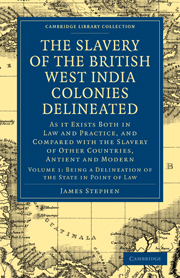 The Slavery of the British West India Colonies Delineated
The Slavery of the British West India Colonies Delineated Book contents
- Frontmatter
- PREFACE
- Contents
- PRELIMINARY CHAPTER: Of the Necessity and Importance of describing the State in question, and the general Plan of the Work
- BOOK I OF THE SLAVERY OF OUR COLONIES CONSIDERED AS A LEGAL INSTITUTION
- CHAPTER I Of the Origin and Authority of the Colonial Slave Laws in general
- CHAPTER II Of the Persons who are subject to Slavery in our Colonies
- CHAPTER III Of the legal Nature and Incidents of this Condition, as they respect and constitute the Relation between the Slave and his Master
- CHAPTER IV Of the legal Nature and Incidents of Colonial Slavery, as they respect its Relations to Persons of Free Condition in general, the Master and his Delegates excepted
- CHAPTER V Of the legal Nature and Incidents of West India Slavery, in its Relations to the Police and Civil Government of the Country
- CHAPTER VI Of this State of Slavery in respect of its Commencement and Dissolution
- Appendix, No. 1
- Appendix, No. II
- Appendix, No. III
- Appendix, No. IV
- Appendix, No. V
CHAPTER VI - Of this State of Slavery in respect of its Commencement and Dissolution
Published online by Cambridge University Press: 07 October 2011
- Frontmatter
- PREFACE
- Contents
- PRELIMINARY CHAPTER: Of the Necessity and Importance of describing the State in question, and the general Plan of the Work
- BOOK I OF THE SLAVERY OF OUR COLONIES CONSIDERED AS A LEGAL INSTITUTION
- CHAPTER I Of the Origin and Authority of the Colonial Slave Laws in general
- CHAPTER II Of the Persons who are subject to Slavery in our Colonies
- CHAPTER III Of the legal Nature and Incidents of this Condition, as they respect and constitute the Relation between the Slave and his Master
- CHAPTER IV Of the legal Nature and Incidents of Colonial Slavery, as they respect its Relations to Persons of Free Condition in general, the Master and his Delegates excepted
- CHAPTER V Of the legal Nature and Incidents of West India Slavery, in its Relations to the Police and Civil Government of the Country
- CHAPTER VI Of this State of Slavery in respect of its Commencement and Dissolution
- Appendix, No. 1
- Appendix, No. II
- Appendix, No. III
- Appendix, No. IV
- Appendix, No. V
Summary
REASONS FOR THIS BRANCH OF THE ENQUIRY
The hardiest champion of the colonies will scarcely refuse to admit, that if there are justifiable causes of slavery, there are also causes of an opposite kind; or that, where such an institution prevails, it is possible for a man to be deprived of his freedom by means manifestly unjust, and quite beyond the reach of any moral defence. Wherever, then, private slavery exists, the law ought carefully to define the legitimate sources of the state, and to guard against its wrongful imposition.
It may also, perhaps, be further conceded, that the favour shown by every servile code, ancient or modern, those of our own islands in our own times excepted, to enfranchisement, has not been wholly wrong; and that there are cases in which it may be fit to allow a slave to emerge from his hapless condition into freedom. If so, the law should provide for those cases; and permit, if not encourage, manumissions.
At all events, an account of the law of colonial slavery would be imperfect, if it should leave unnoticed those rules which apply to the origin of the state, and the means by which it may be dissolved.
OF THE SOURCES FROM WHICH SLAVERY MAY ORIGINATE
It may be convenient here to consider, in the first place, what the servile codes of other ages and countries have declared or enacted on this important head.
- Type
- Chapter
- Information
- The Slavery of the British West India Colonies DelineatedAs it Exists Both in Law and Practice, and Compared with the Slavery of Other Countries, Antient and Modern, pp. 334 - 438Publisher: Cambridge University PressPrint publication year: 2010First published in: 1824


